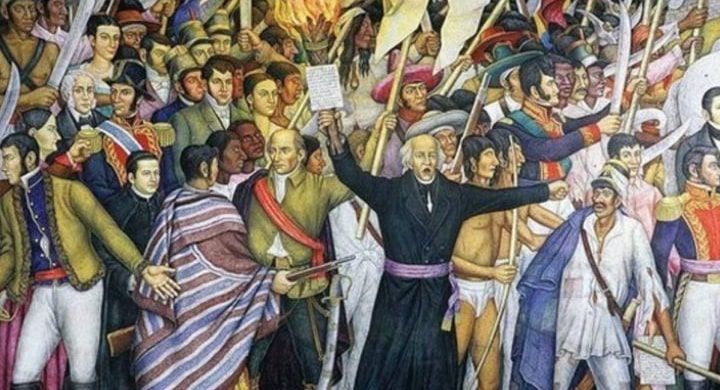The first news of the Mexican Independence in the newspapers of the time
At the time when the events were taking place, what could be published in the Capital's newspapers about the Independence movement? Certainly, only the news authorized by the Viceregal government, which feared the influence that the press could have on the nation's inhabitants.

What could be published in the Capital's newspapers about the Independence movement, precisely at the moment when the events were taking place? Of course, only the news was authorized by the viral government, which feared the influence that the press could have on the nation's inhabitants.
The Diario de México, the first daily newspaper in New Spain, very prudently published the news of the recently initiated insurrection, expressing exclusively the official opinion. The events that occurred in the government were published with marked sympathy; the rebels and their acts were condemned both by the authorities and by the newspaper's collaborators.
And so, one day before Cura Hidalgo gave the Grito de Dolores, the newspaper published the welcome in verse that Juan Camilo Mendívil, an official of the Secretary of the Viceroyalty Chamber, offered to Don Francisco Javier Venegas for his entrance as Viceroy to the Capital, on September 14, 1810.
Hail the great Champion, son of Mars
Hail a thousand times, prudent General
of courage and loyalty firm bulwark,
who frightened the French people.
I can only compare you to yourself,
because it illustrates your eminent merit
it remains for fame to proclaim your glories,
as a faithful witness of your victories.
In good time come to govern us
in the name of the most beloved Monarch:
in good time come to free us
from the shots of the foul-mouthed Corzo.
In good time come to console us,
with the news that you have acquired
of our mother country, and FERNANDO
for whom New Spain is weeping.
The following day, September 15, 1810, an article appears narrating Venegas' lavish entry into the Capital, the welcome given by the people and the officers, as well as the parade held in his honor. Days later it is known, through the same channel, that the first action of the new viceroy against the insurgents was a proclamation proclaimed on September 27, 1810, in which he put a price on the heads of the three main leaders of the Revolution of Independence, not published by the Diario until October 2 of that year, perhaps because of the reluctance to obey the viceroy's order, while the Gaceta de Mexico had published it in an extraordinary edition on September 28.
The articles condemning Hidalgo and the movement appeared mainly in the last months of the year mentioned. On October 6, the newspaper receives a circular letter from the Most Illustrious Archbishop of Mexico to the parish priests of his diocese, addressing them the Pastoral Letter that has been published on the occasion of the events of the Villa de San Miguel el Grande and the town of Dolores. On October 15 an edict of the Holy Office is read, in which it requests Miguel Hidalgo y Costilla, Captain-General of the Insurgents, to appear before the court, accused of apostate, heretic, and seditious. An article by Agustín Pomposo Fernández de San Salvador with a severe judgment of Hidalgo, appears on October 30 of that year:
"We all know that the basis on which the revolutionary project of Hidalgo and his henchmen is mainly based is the ignorance of the poor peons and indigenous people, our brothers, worthy of our compassion and our gratitude. (A) the ignorance they have of the doctrine and the order established by divine Providence are linked as forced consequences, those of believing lawful robberies, murders, sacrileges and insults against the temples and priests, and all the many and very great, and worthy of crying with tears of blood that Hidalgo and his supporters commit, despite being marked before God and men, with the terrible excommunications that the Catholic Church always fulminated against the seditious ones, and with those that the Holy Tribunal of the Inquisition, defender of the same Holy Church, and with the authority that it received from her, has fulminated".
The three famous letters entitled the Anti-Hidalgo was first published on November 3, 1810, and the first one bears this introduction: First letter from a Mexican Doctor to Br D Miguel Hidalgo y Costilla, former Priest of Dolores, former Priest of Christ, former Christian, former American, former Man and Most Reverend General of Robbers and Assassins. The second one was released on November 16 and 17, and the last one between November 18 and 19.
The newspaper of 1811 still brings edicts against Hidalgo, Calleja's banns, etc., but what calls our attention the most is a supposed letter of Miguel Hidalgo (which shows him repentant of the acts committed, of the evils caused, of his sins as head of the insurrection) in which we read textually that the rebel asks his compatriots: honor the King because his power is derived from that of God and later he continues advising them to leave the weapons, throw yourselves at the feet of the throne, fear neither the prisons nor the death and he finishes saying to them.
Be witnesses to all those who inhabit the world; be witnesses to all those who have cooperated in my excesses, of which I have been ungrateful and blind, I have purified the omnipotent, the sovereign, the Europeans and Americans, I would like to undo my errors with as many lives as the arm of the Lord has produced and can produce; I want to die and I die gladly because I have offended the Divine majesty, the human majesty, and my fellow men: I wish and ask that my death may yield for the glory of God and his justice, and for the most convincing testimony that the resurrection must cease at once, concluding these my last and weak voices with the protest that I have been, I am, I will be for all eternity, a Christian Catholic, that as such I believe and confess what our holy mother Church believes and confesses. that I abjure, detest and retract anything I have said against it. Chihuahua, royal hospital, and May 18, 1811, Miguel Hidalgo.
This apocryphal letter was published by the Diario de México between August 10 and 11, 1811. The newspaper's directors did not give their opinion either for or against it, they simply published it following the orders of the viceroyalty government, which tried, by all means, to dissuade the followers of the Independence movement, without succeeding in its purpose.
By María del Carmen Pérez Hernández




